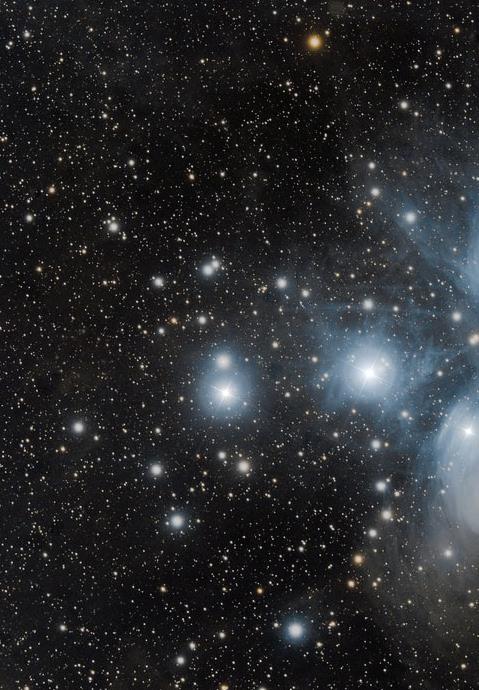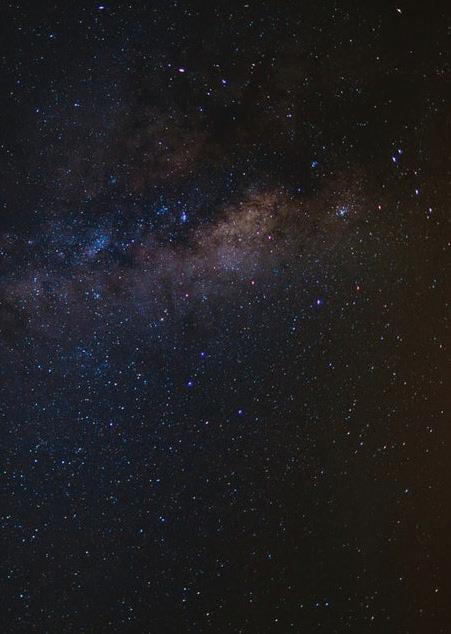
17 minute read
Science, Cosmology And The Existence Of God
Science, Cosmology and the Existence of God Josh Yen
The existence of god has been one of the most controversial discussions in society, philosophy and science.
Whether there is a god or not has significant ramifications on society and would significantly change the way we live. This is why I would like to weigh in on the scientific side of this debate and demonstrate why there is most likely a creator of the universe (a god) given our understanding of cosmology and causation.
A simple formulation of the argument:
If you have had any past experience with the philosophy of religion, you probably know that what I am referring to in my abstract is what philosophers call a cosmological argument. This is an argument from our understanding of the universe to the existence of a god.
While there are multiple formulations of this argument, for the sake of simplicity, I will be using the Kalam cosmological argument, an argument from the finitude of the past. The argument goes as follows:
Premise 1 (P1): If the universe began to exist, then the universe must have had a cause
Premise 2 (P2): The universe began to exist Therefore, Conclusion 1 (C1): The universe has a cause [1] Premise 3 (P3): If the universe has a cause, the cause is a god Premise 4 (P4): The universe has a cause (C1) Therefore,
Conclusion 2 (C2): The cause is a god.
Since this argument is laid out in a deductive syllogism (that of modus ponens), we can see that if the premises are true the conclusion logically follows. In other words, one cannot accept our premises and disagree with our conclusion. Therefore, in this article, I will be defending each of these premises to demonstrate the truth of this argument.

1 “Kalam” is an Islamic school of thought which formulated this form of cosmological arguments (those from the finitude of the past)
2 The finitude of the past is a concept where the universe is past finite and has a beginning; this is in stark contrast to an infinite past.
3 A deductive syllogism is a way of laying out an argument which makes it such that if the premises are true, the conclusion must be accepted. In the case of this article, while the premises aren’t necessarily defended via a priori methods and should be seen as a fundamentally inductive argument, the use of this syllogism entails that one should argue against the premises, not the conclusions.
Premise 1: If the universe began to exist, then the universe has a cause
The first premise of the argument is relatively controversial in the fields of science and philosophy as it is based on the principle of temporal causation. This is the idea that all finite and temporal beings require a cause for their existence. This law undergirds all logical thinking and is a necessary belief for all our pursuits, especially those within science.
A good example of this law would be boiling water. The heat of the fire is the cause or the reason behind the fact that the bonds between water molecules break down and evaporate. It would be scientifically incorrect to claim that the water molecules just evaporated without a cause.
This line of reasoning undoubtedly conforms with all our experiences and is know that things must have a cause and there cannot be uncaused phenomena.
A further reason which supports the principle of temporal causation is the idea that something cannot come from nothing. This comes in the form of the Latin old saying “ex nihilo, nihil fit”- roughly translating to “nothing comes out of nothing.”
If this saying stands, all things which are contingent or subject to time must require a cause. The change of a state of absolute nothingness to a state with something is impossible without an external cause. This concept can be rearranged into a simple deductive syllogism:
P1: If something cannot come from the strongest intuition that we have. We
nothing, all things that come into existence must come from something
P2: Something cannot come from nothing
C1: Therefore all things must come from something
P1 of this argument appears to be self-evident and does not require much explanation. There exists either something, or there exists nothing. Hence, if something cannot come out of nothing, then it follows that something must require an antecedent cause.
4 This is to be contrasted with causation simpliciter, the idea that every single being which exists must have a cause.
5 Now it is clear to note that the theist does not believe in ex nihilo creation simpliciter. Instead, he is just claiming that there are no physical entities. The reason for this is simple, a god is not physical and is a transcendent being. Hence, when a theist uses ex nihilo, he is referring to the idea that there was no physical entities prior to the creation.

Hence, the crux of this argument depends on the strength of P2, which is undeniable. Throughout the history of mankind, no one has ever experienced an ex nihilo (out of nothing) creation (in the strict sense of the term). For if anyone were to point to anything in the world and suggest that it was self-caused, one would rightfully dismiss him as insane. For example, if an explosion occurred in the school’s Science department, surely we would be looking for a cause of such a tragedy instead of suggesting that the explosion just appeared ex nihilo.
Despite this apparent strength, a physicist named Lawrence Krauss has suggested that due to developments in quantum physics, we have observed particles that come into being without an apparent cause and appear to support the hypothesis of an ex nihilo creation [2]. While this approach has been growing in popularity, especially when some scientists start realising the philosophical implications of a finite universe, such a rebuttal, fails to gain traction within academia since Krauss’ hypothesis egregiously overlooks the sea of quantum energy that these particles are fluctuating out of. In reality, this is no ex nihilo causation, instead it is just particles fluctuating from a state of quantum energy.
With this in mind, it appears that the first premise of our argument is well defended and supported, allowing us to move onto the more controversial premise - whether or not the universe has a beginning.
Premise 2: The Universe Began to Exist
Historically, the second premise of the argument has been defended predominantly by philosophical arguments. In this case, I will be approaching this premise from the perspective of science, more specifically the Big Bang hypothesis and the Second Law of Thermodynamics.
Under the Big Bang hypothesis, space, time and matter came into existence a finite time ago. In this model, the universe is currently growing in size and expanding into nothingness.
This hypothesis is supported by two pieces of evidence, Cosmic Microwave Background Radiation (CMBR) and red-shift.
CMBR is a form of radiation which is present in low amounts throughout the entire universe. This suggests that in the past, the universe was dense and “hot”, pointing towards an explosion of energy from a singularity. Over time, this energy “spread out” through the universe leading to this current state of low energy.

Red-shift also provides good evidence for the expanding model of the universe. Red-shift is the concept that as celestial bodies move away from each other or towards each other, the wave frequencies of their light are changed. This leads to either red or blue shifts respectively. Due to universal red-shift that we observe in celestial bodies, we can infer that stars and galaxies are moving away from each other. This suggests that the universe is expanding from an initial singularity in the finite past.
These observations have contributed heavily to the development of the Friedmann-Lemaitre-RobertsonWalker spacetime model which shows that given the current understanding of universal expansion, we can trace the boundary of spacetime back to a finite point in the past. Physicist P.C.W. Davis comments on such a model as follows, “If we extrapolate this prediction to its extreme, we reach a point when all distances in the universe have shrunk to zero. An initial cosmological singularity therefore forms a past temporal extremity to the universe. We cannot continue physical reasoning, or even the concept of spacetime, through such an extremity. For this reason
most cosmologists think of the initial singularity as the beginning of the universe. On this view the big bang represents the creation event; the creation not only of all the matter and energy in the universe, but also of spacetime itself [3].”
Apart from this relatively empirical approach to the beginning of the universe, a finite universe is also defended mathematically by theoretical physicists Arvind Borde, Alan Guth, and Alexander Vilenkin in their paper “Inflationary spacetimes are not past-complete [4]”. In this paper, they demonstrate that “a cosmological model which is inflating or just expanding sufficiently fast must be incomplete in null and timelike past directions [5]”. This essentially means that in any expanding universe, it is inevitable that one reaches a singularity in the past. The universe cannot, mathematically, contract for infinity, hence there must have been a beginning. Since our universe is expanding, it follows that there must have been a beginning.
Now, let us turn to the Second Law of Thermodynamics. The Second Law of Thermodynamics also states that the entropy of a closed system increases irreversibly. When the entropy of a system reaches its maximum, we arrive at what scientists like to call “the heat death” of the system. In such a state, there is no longer any usable energy and the universe would, quite literally, die, as nothing can be done or changed.

Now the problem arises for the proponent of an infinite past. If the universe has been around for past infinity, why are we not currently at heat death? How are we still alive and experiencing the movement of energy and other phenomena that would be impossible in a system with maximum entropy?
Since we have established from the Big Bang and the Second Law of Thermodynamics that the universe must have a beginning, it follows that the universe is past finite. This is the idea that one cannot trace the causal/ temporal chain of the universe back for infinity, since there would be a point where the chain stops.
Conclusion 1: The universe has a cause
Since this argument is deductively valid and the premises are true (as I have shown above), it logically follows that the universe must have a cause for its existence.
6 Entropy is a complex idea but is best explained as the unusable thermal energy within a system. If a system reaches maximum entropy, the system becomes “heat dead” and nothing can be carried out in such a system
However, our Conclusion 1 raises an instant question: what is the nature of this cause, and what are its attributes?
In order to elucidate these characteristics, I will split them into primary natures and secondary natures. Primary natures are aspects that are directly deduced from the argument, and secondary is now in a temporal relationship with
natures are aspects that can’t be directly deduced from the argument yet can be reasonably inferred.
The three primary natures are timelessness, transcendence and a personal connection with the creation. I will spend some time here to elucidate each point. Transcendence: Why must this cause
Timelessness: What does it mean to be timeless? This is a complex question and has been a matter of intense philosophical debate, but for the sake of as a property which shows that a being is not restricted by the passing of time or time does not act on such a being. With this in mind, how do we know that our cause of the universe is timeless?
Since there were no physical states of affairs or change before the existence of the universe, it was a period of physical nothingness, we can state that this period is timeless. Yet since this cause existed prior to the universe in this state of physical nothingness, it follows that it must exist timelessly. For there was no change in the state of affairs in regards to this cause.
Of course, this changed when the cause caused the universe into existence. At this point, one can say that this cause the universe and is no longer timeless. Yet, for all intents and purposes, we can safely conclude that this cause was timeless sans creation [6].
simplicity, I would define timelessness be transcendent? This is quite selfexplanatory. Since the cause existed prior to the universe, it must transcend the universe.
Personal: Finally, we know that the cause must be personal. Due to the nature of causation, the cause is always related to the effect (either directly or indirectly). Since we have no evidence to suggest that anything physical existed prior to the universe, it is safe to assume that there was nothing prior to the universe. When we return to our understanding of direct and indirect causation, we can know that indirect causes only happen when the causal antecedent is causing
7 At this point, it is important to note that these are not scientific observations or empirical demonstrations of this cause. Instead, these are philosophical conclusions given the situation that we are exposed to.
another being or entity and the indirect cause comes as a side effect. Since there are no beings sans the universe, we can see that this cause cannot be indirect and has to be a direct personal cause of the universe.
The secondary attributes include free will, immense power and immense knowledge. Free will comes from the question of why there is something rather than nothing. Since there are no physical laws (that we know of) before the universe’s creation, there appears to be nothing “determining” the cause. There is no reason why the cause had to cause the universe; it could have done otherwise. Why this universe instead of another? Why did this specific universe come into existence instead of another one with vastly different laws of nature? Surely there is nothing necessary about the conditions in the world that we live in. Hence, it appears that this cause does have free will. The attribute of immense power originates from the fact that it created everything in existence, while it is possible for some “butterfly effect” cause, it is more probable that the creator of the universe is immensely powerful. Great knowledge follows on from immense power. If something created the entire universe, it implies that it knows quite a lot.

So let us summarise these attributes and see what it can tell us about the nature of this cause. As we have established, the primary attributes are timelessness, transcendence, and a personal and direct relation with the cause. The secondary attributes are free will, immense power and immense knowledge.
Of course, if one were to claim that this directly proves the existence of the God of classical theism or the Christian God, he would be insane. But when we look at these attributes, it is undeniable that they point towards a theistic explanation of the universe instead of an atheistic one. For it would be an extreme form of atheism, perhaps one not worthy of the name of “atheism”, to suggest that there exists a personal, transcendent, powerful, timeless cause of the universe.
Conclusion 2: The cause is a god
Since we know that the universe does have a cause (Conclusion 1), it follows from Premise 3 that the universe’s cause is a god. I would like to make it clear that this is not an argument for the Christian God, nor is it an argument for monotheism. However, it does point to a cause which has theistic properties.
8 This is the idea that a small cause can lead to a large effect (latter on in the causal chain)
Two objections: Any argument about the existence of a god is expected to raise controversy and discussion. Especially when the argument is so simple, yet so powerful. Hence, I feel that I would be doing the Kalam a disservice if I fail to discuss two of the most common objections.
1) What caused a god?
Although the objection “what caused a god?” is a rather unfounded argument with little to no reason backing it, it is Dawkins’ self-proclaimed “knock-down argument” of cosmological arguments and therefore requires a quick shout out before it can be dismissed with a quick exclamation of “You’ve gotta be kidding me!”
The reason why we can dismiss this rebuttal easily is due to the fact that the objector does not understand the Kalam cosmological argument. If we were saying that all things that exist require a cause, then this objection would be valid.
Yet this is not what I have been defending. If you look at the fine-print of any cosmological argument, it is clear that this is not what we are referring to when we raise a causal principle like the principle of temporal causation
When we raise cosmological arguments, we have a very specific goal in mind. Instead of defending the need for causation simpliciter, one only argues that things which have temporal relationships require causation. It does not apply to timeless or past infinite beings.
Therefore, it can only be concluded that such a rebuttal is aimed at a strawman which no theist has ever tried to defend in the past.

2) Does the nondeterministic nature of quantum mechanics undermine classical ideas about causality?
Due to recent developments in quantum mechanics, some people have suggested that traditional ideas about deterministic causes do not apply. They would suggest that the Kalam is incompatible with non-deterministic causation and would fail. There are a few responses that a Kalam defendant can turn to.
Firstly, it appears that causes do not need to be deterministic to be causes. Even in a nondeterministic universe, causation is still very much real. Since a “cause” is defined as something which leads to another event or causes a change, it appears that even if something is completely non-deterministic, it can still be regarded as a cause.
9 relating to the philosophical doctrine that all events, including human action, are a determined by causes regarded as external to the will.: “a deterministic theory”
One can take a random number generator and say that it is the cause of the picked number even though it is random. Furthermore, under the assumption that we have free will, we are technically not “determined”. Despite this freedom, we can act as causes of certain effects. Us swinging a racket would lead the tennis ball to fly back to the other side of the court.
Hence, objects do not need to be deterministic to be a cause.
Secondly, it appears that even quantum physics abides by certain causal rules. Although some physicists would present the idea that the quantum realm is completely random and is a mess of particles and energy fluctuating in and out of existence, Robert Koons explains that causal relations exist in his book Realism Regained: An Exact Theory of Causation, Teleology and the Mind [7]:
According to the Copenhagen version of quantum mechanics, every transition of a system has causal antecedents; the preceding quantum wave state, in the case of Schrodinger evolution, or the preceding quantum wave state plus the observation, in the case of wave packet collapse.
Therefore, it would appear that causation is very much existent in quantum mechanics even if they are not strictly deterministic.
With these rebuttals to objections that arise from quantum physics, we can reach the conclusion that the principle of temporal causation appears to remain intact and there is no knockdown or significant argument which can be raised from the quantum physics side of things.
Final Thoughts:
Since both of these arguments against the Kalam have been shown to be vacuous, it appears that one can rationally support the premises of our argument. Turning back to our formulation, since this is a deductive argument with sound premises, we can see that the conclusion logically follows; that there is an immensely powerful, transcendent, personal cause for the universe — a god.

Bibliography
[1] Craig, William Lane. The Kalam Cosmological Argument. Wipf and Stock, 2007.
[2] Krauss, Lawrence Maxwell. A Universe from Nothing. Simon & Schuster, 2012.
[3] P. C. W. Davies, “Spacetime Singularities in Cosmology,” in The Study of Time III, ed. J. T. Fraser (Berlin: Springer Verlag, 1978), pp. 78-9.
[4] Borde, A. et al. “Inflationary spacetimes are not past-complete.” Physical Review Letters (2001): n. Pag.
[5] Ibid.
[6] Craig, William Lane. Time and Eternity: Exploring God’s Relationship to Time. Crossway, 2001
[7] Koons, Robert C. Realism Regained: An Exact Theory of Causation, Teleology, and the Mind. Oxford University Press, 2000.







